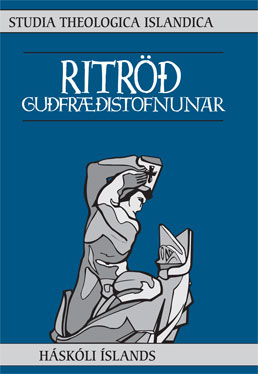Girnilegt til fróðleiks
Syndafallssagan og Júdítarbók
Lykilorð:
freisting, fall, synd, andi mannsins, imago dei, vilji Guðs, forvitni mannsins, ormurinn, temptation, sin, the spirit of man, the will of God, the curiosity of man, the wormÚtdráttur
Útdráttur
Sköpunarsögurnar í Fyrstu Mósebók eru hér skoðaðar út frá því hvernig Guð mótar anda mannsins áður en hann yfirgefur Paradís. Skoðað er hvað Guð ætlaði sér með falli mannsins, samkvæmt sögunum. Horft er sérstaklega á Evu og það að henni fannst forboðni ávöxturinn girnilegur til fróðleiks áður en hún smakkaði hann. Er ormurinn í Paradís Guð í dulargervi að ala upp börnin sín? Til að skoða syndafallssöguna nákvæmlega er hún borin saman við apókrýfu bókina um Júdít. Þegar Eva er borin saman við Júdít má spyrja sig hvort Júdítarbók sé meðal annars hugsuð sem túlkun á Evu í sköpunarsögunni. Eva og Júdít spegla hvor aðra með athyglisverðum hætti sem dregur fram margt í sköpunarsögunum sem annars dvelur undir yfirborðinu.
Abstract
In this article the creation stories in Genesis are explored in order to find out how God shapes the human spirit before the first human beings are expelled from Paradise. The question is also asked, what, according to these stories, God intended with the Fall. Eve is especially looked at, and the fact that she found the forbidden fruit desirable to make one wise, before she tasted it.
Furthermore, the history of the Fall is compared to the apocryphal book of Judith. When Eve is compared with Judith, one wonders if the book of Judith is meant as an interpretation of the character of Eve in the creation story and the story of the Fall. Eve and Judith mirror each other in a way that highlights many elements in the creation stories, that otherwise remain beneath the surface. The mirroring of the stories prompts many unexpected ques-tions, for example if the worm in Paradise is in fact God in disguise, raising his children?


